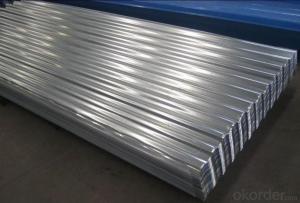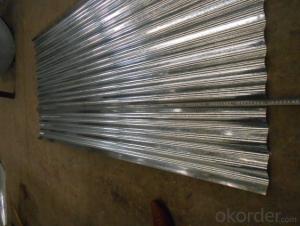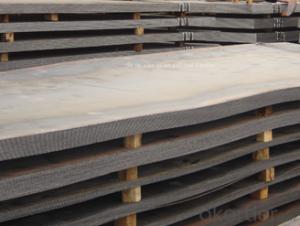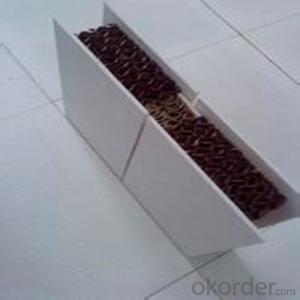Galvanized Corrugated Steel Sheet with Best Quality
- Loading Port:
- Tianjin
- Payment Terms:
- TT or LC
- Min Order Qty:
- 10 m.t.
- Supply Capability:
- 300 m.t./month
OKorder Service Pledge
OKorder Financial Service
You Might Also Like
Size
corrugated steel sheet
thickness:0.14-0.8mm
full hard quanlity
reasonable corrugated metal price
ISO:9001:2000
Introduction
Corrugated Steel Sheet is made of quality galvanized steel sheet with automatic press-forming process. It features on light weight, easy installation, fire proof, water proof, long lift-span, etc...
Specifications
Classification Coating Product Characteristics
Hot dip galvanizing
Zinc coated by hot dip galvanizing; Light coated products have good weldability and formability; Usable from general
processing to deep drawing according to application; Heavy coated products have superior corrosion resistance; Wide
application are possible by selecting spangle or a post treatment.
Applications
Galvanized Corrugated Steel Sheets are used in construction of warehouses, industrial sheds, military establishments,
etc. It is used as roofing material in many buildings, railway stations, waiting zones etc. Thick zinc coating and corrugated
channels makes it water resistant and thus very useful in construction and temporalty establishments.
Our Range of Products
Our wide range of roofing products consists of Trapezoidal Profile, Mandarin Tile, Wall Cladding Corrugation Profile,
and variety of accessories like Flashings, Ridges, Gutters, etc.
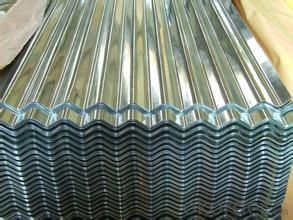
- Q:What are the different sheet metal welding techniques for steel sheets?
- There are several sheet metal welding techniques commonly used for steel sheets, including spot welding, seam welding, and TIG welding. Spot welding involves joining two metal sheets by applying pressure and heat at specific points, creating a strong bond. Seam welding, on the other hand, involves continuously welding along the length of a joint, creating a continuous welded seam. TIG welding, also known as tungsten inert gas welding, uses a non-consumable tungsten electrode to create an arc that melts the metal, forming a weld pool that fuses the steel sheets together. Each technique has its own advantages and is chosen based on the specific requirements of the project.
- Q:Can steel sheets be used in food processing industries?
- Yes, steel sheets can be used in food processing industries. Stainless steel sheets are commonly used in food processing industries due to their many beneficial properties. Stainless steel is resistant to corrosion, which is essential in an environment where food is processed, as it prevents contamination and ensures the safety of the final product. Steel sheets are also easy to clean and maintain, making them ideal for use in industries where hygiene is of utmost importance. Additionally, stainless steel is non-reactive to food, meaning it does not leach any harmful chemicals into the processed food. Steel sheets are versatile and can be used for various applications in food processing industries, such as countertops, worktables, shelving, and equipment surfaces.
- Q:What are the common thicknesses for galvalume steel sheets?
- The common thicknesses for galvalume steel sheets typically range from 0.0149 inches to 0.0478 inches.
- Q:How do steel sheets compare to glass sheets?
- Steel sheets and glass sheets have distinct properties that make them suitable for different applications. Steel sheets are known for their strength, durability, and resistance to corrosion, making them ideal for construction, automotive, and industrial purposes. On the other hand, glass sheets are transparent, allowing light to pass through, making them well-suited for windows, mirrors, and decorative elements. While steel sheets provide security and structural integrity, glass sheets offer aesthetics and visual appeal. Ultimately, the choice between steel and glass sheets depends on the specific requirements and intended use of the material.
- Q:Can steel sheets be used for automotive body repair?
- Automotive body repair can make use of steel sheets, as they possess strength, durability, and cost-effectiveness, making them a popular choice in the automotive industry. By employing steel sheets, damaged or rusted parts of a vehicle's body can be effectively replaced, resulting in a reliable repair. The flexibility and malleability of steel sheets allow them to be easily shaped and molded to match the precise contours and dimensions of the car, ensuring a seamless integration with the existing body. However, it is important to consider the specific repair requirements, as different types of steel sheets may be necessary, such as high-strength steel for structural components or galvanized steel for corrosion resistance. Overall, steel sheets are widely recognized and utilized for automotive body repair due to their versatility and widespread acceptance.
- Q:Can the steel sheets be easily joined with adhesive?
- Yes, steel sheets can be easily joined with adhesive. Adhesive bonding is a commonly used method for joining steel sheets together as it offers numerous advantages. Adhesives provide a strong and durable bond between the sheets, allowing for a seamless connection. They also distribute stress evenly across the joint, reducing the likelihood of failure. In addition, adhesive bonding does not require heat or specialized equipment, making it a cost-effective and efficient solution. However, it is important to select the appropriate adhesive for the specific type of steel and surface preparation is crucial to ensure proper adhesion. Overall, when done correctly, adhesive bonding can effectively join steel sheets together.
- Q:What is the average lifespan of galvanized steel sheets?
- The average lifespan of galvanized steel sheets can vary depending on various factors such as the quality of the galvanization process, environmental conditions, and maintenance. However, in general, galvanized steel sheets can last for several decades, with some estimates suggesting a lifespan of around 50 to 100 years or more.
- Q:Can steel sheets be used for manufacturing appliances?
- Yes, steel sheets can be used for manufacturing appliances. Steel is a commonly used material in the manufacturing industry due to its strength, durability, and resistance to corrosion. Steel sheets can be easily shaped and formed into various appliance components, making it a suitable choice for manufacturing appliances.
- Q:Can steel sheets be used in the construction of bridges?
- Indeed, the utilization of steel sheets in the construction of bridges is possible. Due to its numerous beneficial characteristics, steel has become a prevalent material in bridge construction. Owing to their exceptional strength and durability, steel sheets are well-suited for enduring substantial loads and adverse weather conditions. Furthermore, their flexibility facilitates simpler fabrication and installation processes. Moreover, the ease with which steel sheets can be welded or bolted together makes them highly suitable for the construction of expansive structures such as bridges. In conclusion, steel sheets provide a dependable and cost-effective solution for bridge construction.
- Q:Can the steel sheets be used for industrial machinery?
- Industrial machinery can indeed utilize steel sheets. Steel, known for its robustness, endurance, and resistance to damage, is a favored option for constructing industrial machinery. By shaping, cutting, and welding steel sheets, manufacturers can produce diverse components and parts essential for industrial machinery. The adaptability of steel empowers manufacturers to design and fabricate machinery that precisely meets specifications and demands. Furthermore, steel's capacity to endure hefty burdens, extreme temperatures, and corrosive surroundings renders it suitable for a vast array of industrial applications.
1. Manufacturer Overview |
|
|---|---|
| Location | |
| Year Established | |
| Annual Output Value | |
| Main Markets | |
| Company Certifications | |
2. Manufacturer Certificates |
|
|---|---|
| a) Certification Name | |
| Range | |
| Reference | |
| Validity Period | |
3. Manufacturer Capability |
|
|---|---|
| a)Trade Capacity | |
| Nearest Port | |
| Export Percentage | |
| No.of Employees in Trade Department | |
| Language Spoken: | |
| b)Factory Information | |
| Factory Size: | |
| No. of Production Lines | |
| Contract Manufacturing | |
| Product Price Range | |
Send your message to us
Galvanized Corrugated Steel Sheet with Best Quality
- Loading Port:
- Tianjin
- Payment Terms:
- TT or LC
- Min Order Qty:
- 10 m.t.
- Supply Capability:
- 300 m.t./month
OKorder Service Pledge
OKorder Financial Service
Similar products
New products
Hot products
Related keywords
